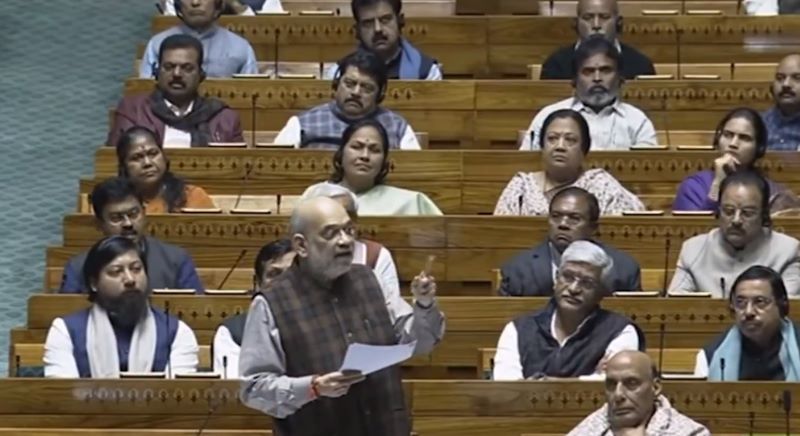 Parliament
Parliament
Parliament passes bills to replace colonial-era criminal laws
New Delhi/IBNS/UNI: The Parliament Thursday passed the Bharatiya Nyaya (Second) Sanhita, 2023, the Bharatiya Nagarik Suraksha (Second) Sanhita, 2023, and the Bharatiya Sakshya (Second) Bill, 2023 with Rajya Sabha approving the legislations seeking to replace Colonial-era criminal laws.
The Upper House approved the three bills by voice vote after discussion.
While the Bharatiya Nyaya Sanhita, 2023 will replace the Indian Penal Code (IPC), the Bharatiya Nagarik Suraksha Sanhita will replace the Criminal Procedure Code (CrPC). The Bharatiya Sakshya bill replaces the Indian Evidence Act, of 1872.
Lok Sabha had passed the three bills on December 20. With both Rajya Sabha and Lok Sabha giving their nod, the three bills would now head to President Droupadi Murmu's desk for her signature.
The bills were passed in the Upper House even as 46 Opposition members remained suspended for the remainder of the winter session of Parliament and thus could not participate in the discussions on the key criminal laws.
In Lok Sabha too, 97 Opposition members remained suspended and hence could not witness the passing of the draft legislation.
Taking to micro-blogging site X, senior Congress leader and former Home Minister P Chidambaram wrote, "The passing of the three Bills with the Opposition benches practically empty (thanks to the 143 suspensions) is like winning a cricket match where the opposite team is not allowed to bat."
Has the government really dumped the British "colonial" criminal laws?
— P. Chidambaram (@PChidambaram_IN) December 21, 2023
Consider the fact that 90-95% of IPC, 95% of CrPC and 99% of Evidence Act have been cut, copied and pasted in the three Bills: can any one deny or debate that fact?
In fact, the government has immortalised…
The amended laws provide for the death penalty for the crime of rape of a woman under 18 years of age, time-bound registration of FIRs, speedy trial, and add the concept of community service for the first time in cases of minor offenses to reduce the burden on jails and cut the number of undertrials.
The new criminal law also defines terrorism and provides for the confiscation of the property of the proclaimed offenders. Under the new law, one could be declared a fugitive in case of 120 crimes as against only 19 crimes at present.
Organized crime has also been defined and explained in these laws for the first time. The new laws provide the death penalty for mob lynching. Notably, crimes against women and children, matters affecting the human body, security of the country's borders, crimes related to the Army, Navy, and Air Force, electoral crimes, and tampering with coins, currency notes, and government stamps among others have been brought at the beginning of the Nyaya Sanhita.
The offence of 'sedition' has been replaced with treason.
The new law provides for a 10-year jail term in hit-and-run cases. In the case of culpable homicide, there is a provision for lesser punishment if the accused takes the victim to the hospital for medical treatment and reports the incident to the police.
Replying to the discussion on the bills, Home Minister Amit Shah said that after the new laws are implemented, there will be one criminal justice system from Kashmir to Kanyakumari and from Dwarka to Kamakhya.
"I tell the people of the country through this House that after the three laws are implemented in their entirety there will be no tareekh pe tareekh (repeated adjournments in courts). There will be such a robust criminal justice system that victims will get justice in three years," the Minister said.
The Home Minister said that once these laws are implemented, the entire process from lodging FIR to judgement will be online, and if any country which would be using technology the most it will be India's criminal justice system.
The Minister said that the new bills were drafted after extensive consultation and he held 158 meetings since the proposal was first considered in August 2019.
Stating that the present criminal laws are nearly 150 years old and were made by the British to primarily protect their treasuries and railways, Shah said that the new laws are victim-centric and accord top priority to matters related to the human body and protection to women and children.
"The soul of these bills is Indian. For the first time, the criminal justice system in the country would be governed by India, for India, and passed by the Indian Parliament," he said.
Both the Houses of the Parliament were adjourned sine die (for an indefinite time) on Thursday, a day ahead of schedule.
The winter session of the Parliament commenced on Dec 4 and was scheduled to conclude on Dec 22.
The session witnessed massive disruptions and multiple adjournments, especially after the Dec 13 Parliament security breach as Opposition MPs trained their guns on the government for the lapse and insisted on the Home Minister's statement.
Support Our Journalism
We cannot do without you.. your contribution supports unbiased journalism
IBNS is not driven by any ism- not wokeism, not racism, not skewed secularism, not hyper right-wing or left liberal ideals, nor by any hardline religious beliefs or hyper nationalism. We want to serve you good old objective news, as they are. We do not judge or preach. We let people decide for themselves. We only try to present factual and well-sourced news.







